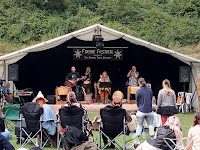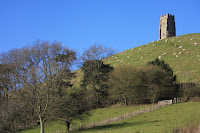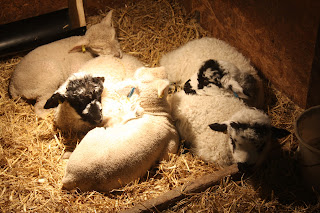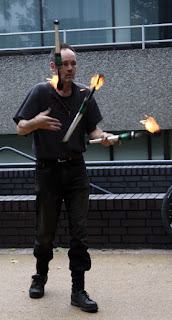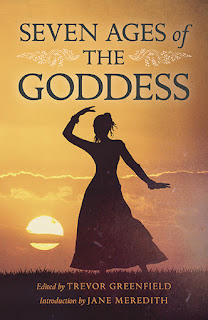Here's my second extract from Traditional Witchcraft for Urban Living by Melusine Draco, about urban magic and paganism. You can read part 1, offering a historical view, here. This offers practical suggestions for ways of working withcraft in the city. It's longer than my usual posts, but worth reading.In my experience, the greatest problem a solitary urban
witch faces is that an urban environment is not user-friendly when it comes to
psychic activity, but then we don’t always have a choice of where we are going
to live if someone else’s needs have to be catered for, too. Mostly I have been
confined to renting small terraced cottages and flats, often with little or no
garden to give that extra bit of space. I make this comment merely to
demonstrate that my Craft activities have not been conducted in a round of
luxurious city apartments and picturesque Grade II listed town houses! Under
these circumstances, for me the key words have always been: acclimatise, adapt
and improvise. Any animal, plant or person that is uprooted and transported to
another environment quickly learns to acclimatise if it is going to survive. I
have adapted to my surroundings and drawn on whatever material/energy there is
to hand, even if it is not what I’ve been used to working with. I improvise by
drawing on existing knowledge and experience. So …
Acclimatise: Accustom yourself to tuning-in to your
environment, even if you’ve lived there for some time. Try to imagine visiting
the place for the first time. Buy a detailed street map or guidebook, and
familiarise yourself with all the hidden nooks and crannies in the immediate
vicinity. Is there a park nearby? Public gardens? Churchyard? Cemetery? What
trees are growing locally? Which are the most important/attractive buildings? Where is the nearest river or canal? Where is
the oldest church? Take your time … explore … rediscover … acclimatise.
Adapt: Modify or adjust the way you look at things. There is
no point in wishing you were elsewhere when circumstances dictate that you
remain where you are. But on the other hand there’s nothing quite so
mind-numbing as doing the same thing, day in day out, for weeks on end. For a
change, try walking to the shops, school, or travelling to work, via a
different route. Examine what’s growing in all the front gardens along the way
to the shop, school, station or bus stop. Make sure you take time out for lunch
- and get out of the home or working environment for an hour - even if it’s a
wet Wednesday afternoon: after all, a witch shouldn’t be afraid of a little
drop of Elemental Water! Start seriously interacting with your environment …
adapt.
Improvise: Be prepared to perform a magical working at any
time, without preparation, and without what is considered to be the ‘proper
regalia’. Be aware of the magical signs Nature has to offer and be ready to act
spontaneously, even in the middle of a crowded railway station or shopping mall
during rush hour! It may also come as a bit of a shock to realise that a large
number of books mentioned in this text are not about witchcraft, or written by
witches. This is because we are learning to improvise and look at things from a
different or unexpected perspective. Before we go out and meet Nature face to
face, however, there may be one or two changes needed to enable us to
re-connect with the natural, elemental energies that are an essential
ingredient within any magical environment. Sorry … we’re not talking about
symbolic bowls of water, salt, night-lights and a joss stick to mark the
quarters on the sitting room rug, we’re talking about encountering real
Elemental Air, real Elemental Water, real Elemental Earth and real Elemental
Fire - up close and personal!

This is … wait for it …
fresh air! It’s the
stuff every living thing on the planet needs to breathe to stay alive but,
apart from the occasional jaunt to a pagan camp, a large number of urban pagans
appear to be terrified of it. I’ve been into some homes where the stuffy,
cluttered atmosphere is so over-powering that you could cut the reek of stale
incense with a knife. Whilst we appreciate that modern society no longer allows
us to live with our doors and windows wide open, we must get used to letting
cleansing air back into our lives.
There is a purifying element to fresh air! In both religious
and magical terms, however, Elemental Air is usually represented by smoke from
the incense carrying our prayers and entreaties up to the gods. As Joules
Taylor observes in Perfume Power, the burning of fragrance to represent
questions or appeals is an ancient and well-nigh indestructible facet of
worship. In other words, from very early times fragrance has been associated
with the gods, the soul and spiritual qualities. Learn to recognise natural
fragrance (not always pleasant) from the world around you, and not to rely
totally on the contrived atmospherics of the incense burner!
As Jules Taylor goes on to observe, our once highly
developed sense of smell is now generally under deployed and now perhaps the
least-regarded of all human senses. We can improve our ‘scent perception’ by
simply concentrating on becoming more aware of the smells around us.
Unfortunately, the urban witch also has to contend with exhaust fumes,
fast-food outlets and all manner of other municipal pollution, but with
practice it is possible to detect the faint fragrance of Nature. If we want to
reconnect with Nature the first thing we must do is sharpen our senses and
learn to read the signs that come to us on the breeze
Elemental Air brings lightness and freedom of spirit, as
well as being a universal symbol of irresistible force and uncontrollable
power. Exercise: In town it’s often difficult to find a moment, or even a place
to relax. In the larger towns and cities the noise is a constant, 24-hour
drone of traffic, where people never seem to sleep. With the use of a local
map, find a ‘green spot’ … even if it’s only a small churchyard or square …
where you can sit, watch and listen.
Okay, but what are we watching and listening for?
Nature … because she is there all around us, all the time.
For example, I’ve encountered a green woodpecker while sitting in the small
courtyard garden of a coffee shop in the middle of town. I’ve seen (and heard)
hundreds of these birds over the years, but this was the closest I’d ever been
… just five feet away. How many different birds (most certainly creatures of
Elemental Air) can you identify? If the answer is very few, then how can you
hope to begin to read those ‘signs’ that make up a large part of the witch’s
world? Invest a few coppers in a book on British birds from a local charity
shop, or buy off e-bay, or ABE-Books on the Internet. Start learning, even if
it’s only by watching the pigeons in Trafalgar Square! You’ll be surprised how
many different birds can be spotted in our towns and inner cities on a regular
basis, and birds have been always been considered bearers of omens since
ancient times.
Elemental Water: Water is the essential ingredient of life
but how many of us consciously pay homage to this fact in our day-to-day
existence? We use water for the daily ritual cleansing of our home and body, to
water the garden or wash the car, but often neglecting its spiritual
properties. From prehistoric times, our ancestors considered springs and
‘watery places’ to be sacred, and the contemporary custom of throwing coins
into wells and municipal fountains goes back to the times when votive offerings
were cast into the waters to propitiate the gods. We should be mindful that
water, particularly spring water, is truly a ‘gift of the gods’ and not to be
treated casually.
For magical purposes we need to re-connect with water, for
even the most rubbish-clogged urban watercourse carries lifegiving properties
along its muddy artery. If we live close to a river, canal, park or golf
course, then it makes it easier to observe water at close quarters during the
changing seasons, and come to recognise the local wildlife that depends on it.
Even the modern fountain in the city centre can be a focus for meditative
moments when the sun catches the colours of the rainbow in the falling spray.
Our local brook regularly acts as a depository for shopping trolleys, traffic
cones and other domestic debris, as it runs right through the centre of town.
Growing through the restraining brickwork, however, is a magnificent elder tree
and an amazing collection of harts-tongue ferns, which I haven’t seen in such
profusion since leaving Wales.
Most days the flow is the barest trickle but when it rains,
the watercourse becomes a raging torrent. The only other ‘watery’ place is the
dried bed of an old pond that only floods during the winter months, but this is
the real magical place. The water has gone because the surrounding urban
development has drained it, but the site is old, with a large stand of reed
mace and a host of other interesting creatures living in this well-established
habitat.
There are numerous ideas for a ‘water feature’ in the home,
and much depends on personal taste rather than pagan cliché. Even the smallest
courtyard can host an ornamental wall fountain, birdbath or wooden barrel
containing miniature water lilies (although these do require direct sunlight for
success). Inside, a large bowl with flower heads floating on the surface can be
extremely attractive … but not a good idea if you have small children or a
large dog. Be creative, use your imagination.
Elemental Water ‘saturates our lives and language and is the
most compelling of human metaphors’ wrote Rebecca Rupp in Four Elements; it is
the universal symbol of primal mystery.
Exercise: Trace your local source of natural water and try
to follow it for as far as possible. You may be lucky enough to live near a
pond, stream, lake, river or canal and can watch the changing face of the
seasons at the water margin. How many different species of flora and fauna
dependent on an Elemental Water habitat can you identify? If the answer is very
few, then how can you hope to begin to read those ‘signs’ that make up a large
part of the witch’s world? Remember that pure (or purified) water is sterile
and that for magical purposes we need to work with natural water. Unless you
have access to a spring or holy-well, place a wide bowl or jar outside on a
window-sill, to catch rain or moisture; transfer to a sealable bottle and keep
for use in your rites. But don’t drink rainwater!
Elemental Earth: Of all the elements, Earth is the symbol of
solidity and substance, and the ‘most intrusive in our daily lives’, was an
observation made by Rebecca Rupp. The subject of global warming and saving the
planet is at the forefront of everyone’s mind these days, but for the witch,
the sanctity of the Earth and Nature has always been paramount. The witch does
not ‘worship’ Nature but exists in a sort of ‘spiritual care-taking’ capacity –
after all, it is from Nature direct that we divine the signs and symbols that
give us the power over natural things. Communing with Nature isn’t always easy
in an urban environment and it is very often necessary to ‘manufacture’ a
moment of peace for ourselves amongst the busy populace.
Dig out a copy of that famous junior school poem by William
Henry Davies, ‘Leisure’ that begins: “What is this life if, full of care, We
have no time to stand and stare … ” and take a verse for your very own Thought
for the Day. Without compromising your personal safety, try to visit the local
park or old cemetery during school hours, or early on a weekend morning, when
you can guarantee having a quiet corner to yourself for a while. Many years
ago, long before the ‘great clean up’ got underway, we lived near Highgate
Cemetery and this was a perfect place for a meditative or magical moment. The
magnificent monuments were overgrown and apart from the occasional tourist
visit at weekends, we pretty much had the place to ourselves via a discreet
hole in the boundary fence. Not only had Nature taken over completely and the
place full of wildlife, but there was also the comfortable familiarity that all
witches should have with both the spirits of the dead, and the spirits of
Nature.
But how do we bring Elemental Earth into our urban home? By
growing something, of course! Not everyone has green fingers but it doesn’t
take much effort to introduce a small selection of supermarket-grown potted
herbs to the kitchen window-sill, does it? This small gesture gives a dual
sense of purpose, in that we are caring for something that we can utilise in
our day-to-day cooking and magic. Go one better and buy a small kitchen bay. As
well as having culinary uses, bay is one of the oldest sacred herbs with strong
protective powers when used in spell-casting. My bay started out (many years
ago) some six inches high and now stands three-foot tall in a large pot that
can be transported anywhere. This is your first step in learning (or
re-learning) about wort-lore within the confines of urbanity.
Elemental Earth gives a feeling of security. Universal myths
claim that first man was created out of clay, earth or sand; traditionally
Earth is represented by the ‘mother’ and the harvest.
Exercise: It must be obvious that Elemental Earth is much
more complex than we would first imagine. We live on it, our food comes from
it, we bury our dead in it, Elemental Earth (North) is the direction of magical
Power … and yet most of us are afraid of getting our hands dirty by interacting
with it. So now is the time to rediscover the Earth energies around where you
live, by going out and making time to stand and stare!
This also time for an exercise in personal honesty; be
truthful, just how comfortable are you with quiet corners of a park or
cemetery? If the answer is ‘not very’, then how can you hope to begin to read
those spiritual and temporal ‘signs’ that make up a large part of the witch’s
world? Again, I would repeat, never compromise your personal safely while on
your quest, but try to determine whether you are nervous because you feel
vulnerable (i.e. alone), or whether you are uncomfortable with the close
proximity to the natural (and supernatural) worlds.
Elemental Fire: In its natural state, Elemental Fire is the
most elusive of the four within an urban environment, unless the local vandals
have ignored the ASBO and gone on a car-torching spree! Fire has always played
an important part in esoteric gatherings but the historic concept of a coven
gathering around the bonfire in a woodland clearing is highly suspect. A single
candle flame can be seen for miles on a dark night, and in the days when
witches were falling foul of the law, a blazing fire would have been an open
invitation to the Witch Finders. Fire, however, is part of the Mysteries of
Craft and an integral part of any magical working.
First man probably encountered fire as the result of a
lightning strike, and so he would have been left in no doubt that the resulting
blaze was indeed heaven-sent. From that time to the present, that god-gift of
heat and light has provided the dualpurpose of hearth fire (domestic) and
sacred flame (religious) … both equally as important as a spiritual focus. For
our purposes the hearth-fire is, of course, the most obvious, for witches require
no formal temples or sanctuaries in order to follow their Craft. Our urban
problem of fire lighting was solved by purchasing a circular patio heater –
this is a domed-mesh cover affair, with a tray underneath to catch hot ash so
it can safely be used on decking – and also doubles as a barbeque. It can be
used in confined spaces and moved to another home when necessary. We also have
a collection of old-fashioned lanterns (probably nearer the true), which double
up for both indoor and outdoor working … and infinitely safer than naked
candles.
Elemental Fire is the symbol of warmth, passion … and
danger. It can offer the welcome of a glowing hearth or an uncontrollable
conflagration that destroys everything in its path. Those who pass through the
flames and survive, emerge transformed and improved.
Exercise: Learn to love fire and make a point of always
having a candle burning (safely) while you are at home. Treat yourself to a
‘special’ holder that will always act as the focus for your devotions – whether
indoors or out – so think in terms of something generous, expensive and
wind-proof, like a stormlantern. If you are fortunate enough to have a patio
heater or an open fire, buy some of those wonderful copper sulphate- coated
pinecones that produce the most amazing coloured flames - perfect for
divination - but don’t cook over them! Now … how comfortable are you with fire?
If the answer is ‘not very’, then how can you hope to begin to read those
divinatory ‘signs’ that make up a large part of the witch’s world?
Important: When out and about, never put yourself at risk by
wandering in remote places. More attacks on lone people occur in urban areas
rather than out in the countryside, so do not be foolhardy – the gods do not
always protect..
You can view Traditional Witchcraft for Urban Living on Amazon and on publisher Moon Books' website.
Traditional Witchcraft for Urban Living was previously called Mean Streets Witchcraft and I reviewed it here: http://www.badwitch.co.uk/2011/02/review-mean-streets-witchcraft.html
The top picture is the book cover. The rest are photos taken by myself, Lucya Starza, in and around London.



